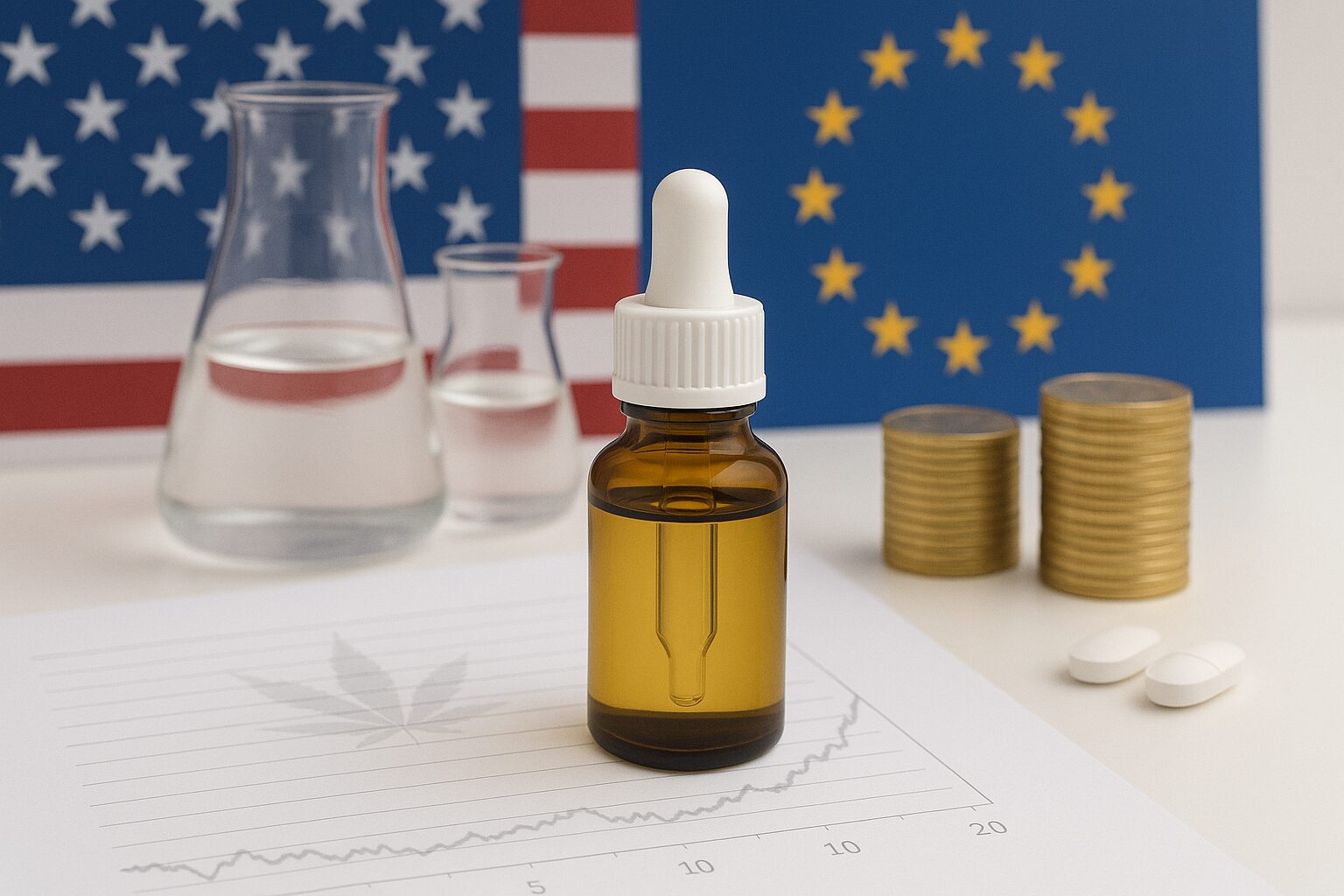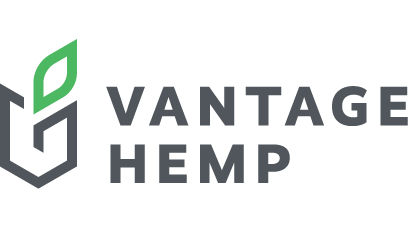
29 Oct Selling CBD in the USA and EU
Two Sales Reps, Two Continents – A Conversation on selling CBD in the USA and EU
The global CBD industry is booming, but the legal landscape differs drastically from one region to the next. As Director of Sales at Vantage Hemp, I spend my days navigating very different regulatory landscapes. As we prepare for CPHI 2025 in Frankfurt, I thought I would share an example of our partnership with Welding GmbH A highly respected German-based company with more than seventy years of international pharmaceuticals experience.
On one side is our home market in the USA, on the other is Europe – where my partner Ali Azak at Welding GmbH works with our European customers. Here’s how the two worlds compare:
Cultivation rules: prescriptive in Europe, flexible in the U.S.
When it comes to hemp farming, EU law only allows hemp from an approved seed catalog. Farmers must use certified seeds and varieties must contain <0.3 % THC. Fields must be registered, and farmers must follow Good Agricultural and Collection Practices (GACP) to maintain traceability.
Ali, on Europe’s strict seed and cultivation requirements:
“Our European customers therefore expect documentation showing where the biomass was grown, the specific seed variety and proof that cultivation follows GACP. “
The U.S. is much looser. After the 2018 Farm Bill took hemp out of DEA control, farmers here grow whatever hemp meets the 0.3 % THC limit. Farmers can grow numerous cultivars without registration. Most jurisdictions only require that the biomass meet GACP standards and stay below the THC limit.
Further, when it comes to API manufacturing, phenotypes and terpene profiles don’t really enter our discussions. Prospective partners care more about cGMP compliance and meeting target monograph specifications for APIs than they do about seed provenance or cultivar expression.
Clearing up regulatory confusion when selling CBD in the USA and EU
Many prospects mistakenly believe manufacturing CBD requires a DEA Schedule I license. I often find myself explaining that a DEA license is not required if the CBD is derived from hemp. A license is needed only when CBD is extracted from marijuana (a cannabis plant that contains >0.3 % THC) or when producing synthetic cannabinoids.
In Europe, the confusion is over what CBD even is. Ali explains that extracted CBD is treated as a novel food, a cosmetic, a cannabis product, and a medicine at the same time.
“Under European novel food regulations, no manufacturer may sell CBD products until a product or formulation is approved, and not one approval has happened yet. Markets for cosmetics are complex and limited to topical CBD applications. Therapeutic claims are not allowed. In member states where cannabis access is more mature, CBD may be accessed through doctors, prescriptions, and pharmacies, or public dispensaries. As medicine, new pharmaceutical applications are expected to follow normal drug development guidelines as set out by European Medicines agency. Our joint filing will meet these standards and open the door to regional medical cannabis markets. “
That process frustrates some prospects, but he pitches it as a chance to prove quality and safety. We explain that Europe’s high bar isn’t a barrier but a route to building long‑term credibility. At least one thing is becoming clear, CBD is now recognized as a non-narcotic across all EU member states, which has removed a huge barrier to entry.
Consumer access: grey‑market boom vs. cautious rollout
Market size vs. market trust
The U.S. CBD market is a “grey area” that grew first and asked questions later. Polls show that more than 60 % of U.S. adults have tried CBD. With little FDA enforcement, and only one approved CBD drug, consumer access is huge, but product quality is inconsistent. We caution prospects that this environment can lead to low‑quality products and consumer safety risks.
Across the pond, Ali sees a smaller market because Europe insists on safety before products hit the shelves. “It’s not illegal here; it’s just slow,” he jokes.
The EU requires novel‑food approval for ingestible CBD and often classifies CBD intended for medical use as an active pharmaceutical ingredient (API). Ali emphasizes that while the market is smaller, the pre‑market approval process fosters trust: “We frame this contrast not as one market being legal and the other illegal, but as a difference between immediate market access (U.S.) and pre‑emptive regulation (Europe).”
When customers ask why U.S. products can’t simply be sold in Europe, we use the opportunity to highlight the gap between local laws and international opportunities. For Ali, customers often ask why American CBD can’t be sold in Europe.
“I remind them that our rules aren’t meant to keep U.S. products out; they’re there to make sure any CBD sold here meets our standards,” he says.
As Ali notes, compliance and transparency become a selling point, not just the cannabinoid content or formulation. As a US-based manufacturer, we understand that U.S. products might not meet EU novel‑food requirements or pharmaceutical GMP standards, but these regulations are not barriers; they are opportunities to differentiate with compliant, high‑quality products that do meet these standards.
Vantage Hemp’s CBD isolate API is phenotype‑agnostic, GACP hemp-derived, and produced to internationally recognized cGMP standards such as ICH Q7 and PIC/S. In the case of Vantage Hemp and Welding GMBH, our regulatory and quality assurance teams have collaborated internationally to bridge knowledge gaps and reassure our clients that Vantage Hemp’s CBD APIs can meet European pharmacopoeia standards.
In fact, we are filing our ASMF and CEP submissions together. We are all very excited about the future of CBD in markets around the world.
Why certifications matter
Both of us agree on one thing: quality certifications are the bridge between these markets. In Europe, EU GMP and GACP certificates are the ticket to entry. Ali notes that without them, no buyer will even start a conversation.
In the U.S., those same certifications are not legally required, but they set Vantage apart. With so many questionable products out there and repeated FDA warning letters being sent to bad operators, showing that we meet global standards builds trust.
What we’ve learned
Selling CBD across borders means mastering two languages: one of rapid growth and consumer demand in the U.S., and one of careful regulation and pre‑approval in Europe. Ali and I both see these differences as opportunities rather than obstacles. As Ali puts it, “Compliance isn’t paperwork; it’s how we prove we’re worth trusting.”
Bringing it all together: How we position Vantage Hemp
By exceeding the strictest standards, we ensure our products can succeed on both sides of the pond. Our sales team uses these regulatory nuances to build trust:
- Education first – We clarify misunderstandings about DEA licenses, THC limits, plant sources, and compliance definitions. By demystifying regulations, we help customers see compliance as an advantage rather than a barrier.
- Transparency and documentation – We provide detailed certificates of analysis, traceability records and evidence of our GMP and GACP certifications. For European partners, this documentation is essential; for U.S. partners, it sets us apart.
- Leveraging global expertise – By operating under the most stringent, internationally recognized GMP standards, such as ICH Q7 and PIC/S, we can deliver pharmaceutical‑grade CBD extracts anywhere. Our submission of two Drug Master Files to the FDA accelerates Vantage Hemp’s international applications, as does our PIC/S certification.
How to sell CBD in the USA and EU?
When selling CBD in the USA and EU, navigating the contrasting regulatory landscapes of the U.S. and Europe requires technical knowledge, transparency, and clear communication. By understanding each region’s approach to novel‑food, cosmetic, pharmaceutical, and cannabis-specific regulations, our combined sales teams turn complexity into a competitive advantage. We don’t position one region as better than the other; we show how stringent standards in Europe and a rapidly growing market in the U.S. create opportunities for compliant, high‑quality CBD products everywhere.
Working with Ali has taught me that selling CBD across borders is more about education and transparency than anything else. We each speak different regulatory languages, but we’re united by a commitment to quality. When prospects see that our commitment to GACP and GMP exceeds what’s legally required in the US, and that we treat differing international regulations as a pathway to trust, they recognize the value of partnering with Vantage Hemp and Welding GmbH.
Sources
Hemp – European Commission
https://agriculture.ec.europa.eu/farming/crop-productions-and-plant-based-products/hemp_en
How Quality Standards Are Changing the CBD Industry | Vantage Hemp
https://vantagehemp.com/2022/09/27/how-quality-standards-are-changing-the-cbd-industry/
The cannabidiol contradiction | safefood
https://www.safefood.net/food-safety/news/cbd
GMP, GACP, & GAP Quality Control Certifications For Cannabis Businesses – CannDelta Cannabis Licensing Consultants
https://canndelta.com/gmp-gacp-gap-quality-control-certifications-for-cannabis-businesses/
Key Differences in CBD Regulations: United States vs. European Union
https://www.cbd-api.com/2025/09/19/key-differences-in-cbd-regulations-usa-vs-eu/

Sorry, the comment form is closed at this time.